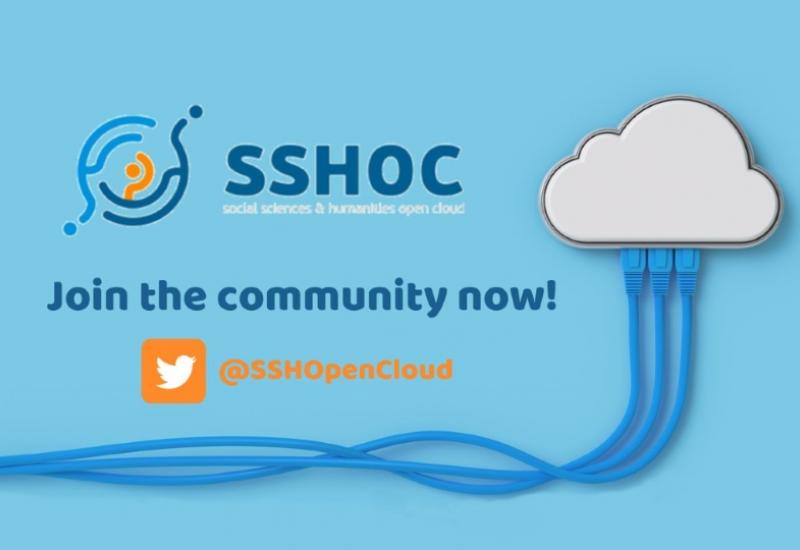
- Social Sciences & Humanities Open Cloud
“SSHOC” - Social Sciences & Humanities Open Cloud is the acronym to remember

Date:
06 February 2019
SSHOC pools together Research Infrastructural excellence from the Social Sciences & Humanities Cluster Communities
A new cloud-based infrastructure to make data, tools and training available for scholars in the social sciences and humanities
SSHOC, one of the five European Union H2020 Programme “ INFRA-EOSC-2018” recently funded cluster projects (together with ENVRI-FAIR, PANOSC, ESCAPE, EOSC-LIFE) that will leverage and interconnect existing and new infrastructures from the SSH ERICs and foster interdisciplinary research and collaboration.
An ambitious number of 47 organisations, experienced and skilled in Social Science & Humanities Infrastructures have gathered from all over Europe to collaborate together on SSHOC, the Social Science and Humanities Open Science Cloud project, coordinated by the Consortium of European Social Science Data Archives (CESSDA). The project starts its journey in January 2019 and runs through to April 2022 with a funding support of 14.5 million euros to realise the transition from the current landscape with disciplinary silos and separated e-infrastructure facilities into a fully-fledged cloud-based infrastructure where data are FAIR, tools and training readily accessible, thus providing a significant contribution towards achieving the vision put forward by the European Cloud Initiative - and support the implementation of European Open Science Cloud.
“To realise the Social Data Cloud, where data, tools and training are made available to data users, the ESFRI’s will join forces with the other social sciences and humanities ERICs (CESSDA, DARIAH, CLARIN, ESS, SHARE) as well as other international organisations. Such a cooperation is vital to ensure the best possible result for users. It also ensures that the expertise across the fields is shared, as inclusive as possible and made available. Moreover, it stimulates multidisciplinary collaboration and has the potential for greater social impact.”
Ron Dekker, Director CESSDA, Coordinator SSHOC
For the first time all European Social Science and Humanities’ Research Infrastructures join forces to build the social sciences and humanities’ part of the European Open Science Cloud
All SSH ESFRI Landmarks and Projects (CESSDA, ESS, DARIAH, CLARIN and SHARE), relevant international SSH data infrastructures and the Association of European Research Libraries (LIBER) participate in the SSHOC project ensuring an inclusive approach. The consortium has the expertise to cover the whole data cycle: from data creation and curation to optimal re-use of data and can address training and advocacy to increase actual re-use of data. The consortium is also very well placed to address SSH specific challenges such as the distributed character of its infrastructures, multi-linguality, huge internal complexity of some of the data it deals with and secured access to sensitive data.
Harnessing the innovation potential of infrastructural support for digital open scholarship
The project will pool, harmonize and make easily usable tools and services that will allow to process, enrich, analyse and compare the vast heterogeneous collections of SSH data available across the boundaries of individual repositories or institutions in Europe. The project will build the common SSH Cloud, maximise reuse through Open Science and FAIR principles, interconnect existing and new infrastructures and set up a Governance for SSH-EOSC. The expected impacts of the Social Science and Humanities Open Science Cloud:
Join our Community & receive all latest updates on Twitter @SSHOpenCloud and LinkedIn
Contact us for
SSHOC Coordination - CESSDA: Amir Spahic
Communication, Dissemination, and Impact - Trust-IT: Marieke Willems
Fostering Communities, Empowering Users, & Building Expertise - LIBER: Vasso Kalaitzi
SSHOC partners and collaborating organisations
Consortium of European Social Science Data Archives (CESSDA ERIC), Survey of Health, Ageing and Retirement in Europe (SHARE), European Social Survey European Research Infrastructure (ESS), European Research Infrastructure for Language Resources and Technology (CLARIN ERIC), Digital Research Infrastructure for the Arts and Humanities (DARIAH ERIC), Stichting LIBER (LIBER), Koninklijke Nederlandse Akademie van Wetenschappen (KNAW), University of York (UoY-ADS), Stichting Katholieke Universiteit Brabant (TiU), Trust-IT Services Limited (TRUST-IT) & linked parties Commpla SRL (COMMPLA), Trust-IT SRL (TRUST-SRL), Semantic Web Company GmbH (SWC), Fondation Nationale des Sciences Politiques (Sciences Po), The University of Nottingham (UNOTT), Deutsches Archäologisches Institut (DAI), Centre national de la recherche scientifique (CNRS), Consiglio Nazionale delle Ricerche (CNR), University College of London (UCL), Foundation for Research and Technology - Hellas (FORTH), Stichting CentERdata (CentERdata), The National Gallery (NG), Norwegian Centre for Research Data (NSD), Fondation suisse pour la recherche en sciences sociales (FORS), University of Essex (UKDS), Leibniz-Institut für Sozialwissenschaften (GESIS), Göteborgs Universitet (SND), Tampereen yliopisto UTA-FSD), Rigsarkivet (DNA), Univerza v Ljubljani (UL-ADP), Universitat Wien (AUSSDA), Universitat Pompeu Fabra (UPF), City University of London (City), Max-Planck-Gesellschaft zur Förderung der Wissenschaften e.V. (MPISOC), Università Ca' Foscari Venezia (UniVe), Stichting Katholieke Universiteit (RUN), Eberhard Karls Universität Tübingen (EKUT), Athina - Erevnitiko Kentro Kainotomias Stis Technologies Tis Pliroforias Ton Epikoinonion Kai Tis Gnosis (Athena), Univerzita Karlova (CUNI), Georg-August-Universität Göttingen Stiftung Öffentlichen Rechts (UGOE), Instytut Chemii Bioorganicznej PAN (PSNC), Österreichische Akademie der Wissenschaften (OEAW).
Read more about SSHOC here: https://www.linkedin.com/pulse/sshoc-social-sciences-humanities-open-clo...
